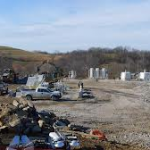Part 2. The Cost That Cannot Raise Its Head
By S. Tom Bond, Resident Farmer, Lewis County, WV
There are many financial losses never accounted for in the development of gas from the Marcellus shale. The drilling platform and deeply rocked roads are essentially taken out of production forever, removed from any kind of production. Pipelines and unimproved areas are out of use for the time of use for production and the 70 to 90 years beyond required for the re-growth of timber (if ever).
Building sites are lost, effects of on-sight disposal of wastes, which seep into the ground or are buried there, are a loss. The numerous compressor station locations can never be reclaimed completely, and depress values in their neighborhood. Lifestyle issues such as light, noise, smell, view and trespassing beyond the well pad and roads are completely forgotten in the industry accounting.
All these are ignored, externalized costs. Costs shoved off into the residents of the area where drilling is done. How would you establish a monetary value on these?
Price is the amount a willing buyer would pay a willing seller. Price determination could be made by looking at the price of a property before drilling and sale to an informed buyer afterwards. Obviously, several cases of such transfers could not be easily found. Once there is drilling in the neighborhood, property sales are not easy.
Often price is taken as the opinion of an expert – a real estate appraiser. He uses comparable sales to determine a fair price – the procedure is well worked out by the profession. What do you think would happen to a real estate appraiser who gave a large depression of price by drilling, even if thoroughly proven by accepted standards? He would be blackballed, of course, just as the university professor who finds fault with industry interests, when they are donating to his university.
The situation is just like the one in court, where the rules of evidence for contamination of aquifers is so strict it is almost impossible to get a judgment, even though something like 7% of wells leak at the time of completion and far more in time, as evidenced by records from Pennsylvania Department of Environmental Protection, an industry friendly government agency if there ever was one.
These externalized costs are a contribution from persons living in the drilled areas to the drillers. And it really is coming from society as a whole, without recognition. An owner, a real live owner, will die. He/she has tenure, sometimes for much of his lifetime, sometimes only for a few years. It can be taken from him by eminent domain for the benefit of society by the government, with full value compensation, so it is just entrusted to him for the tenure. In shale lands, it is as though the government demands this contribution, this externalized cost, from the person caught with the land.
He or she is forced to contribute in exactly the same sense as if someone put a gun in his/her ribs and said “hand it over.” Government authorized violence will happen if compliance does not occur. This is the real basis of the injustice. Even the individuals who get royalty are paid just for the gas, not the devaluation of their property. For the surface owner it is a “reverse depletion allowance,” an additional burden.
Has this had any effect on property values? By June 29, 2011, Chad Davis was able to point to eleven banks in New York State “that will not make loans on properties, or the adjoining properties, that have a ‘gas lease’ on it for hydrofracking purposes.” The list included Wells Fargo, Bank of America and FHA. New York State is still undecided about allowing fracking.
Most loans on property are bundled and resold by the banks that make them on the “secondary market.” Largest among the buyers are Fannie Mae and Freddy Mac, government sponsored but privately traded entities. There are elaborate rules for the lending banks to follow to protect the interest of the secondary market, primarily set by Fannie Mae and Freddy Mac.
According to Greg May, a New York State mortgage specialist, there are several conflicts with leases which technically put the borrower in default on his loan. They have to do with transferring some of the property rights, and consequently value, to third parties (the leaseholders).
Like the coal industry before them, the drillers are destroying productive capacity of vast stretches of land, and causing pollution that will last millennia, and the change is largely ignored. I have calculated elsewhere that the surface taken out of production by full development of the Marcellus alone is equivalent to an average size county of Ohio, but in small pieces and narrow strips over Pennsylvania, West Virginia, Ohio, New York and Maryland. This is living space for a third of a million people, at the average population density of Ohio. These damages are unpaid for, like the work of the coal barons. Unlike the coal, the gas will be exhausted in two or three decades.
Note: Assistance was provided by Lettie Butcher of Preston County, WV.

